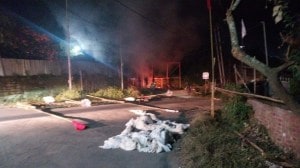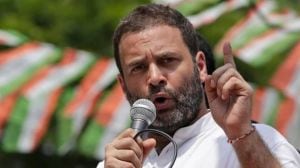‘Victim of terror’ Haneef to Muslim youth: be careful, world is watching
The presence of Dr Mohammed Haneef at the International Seminar on Terrorism gave another dimension and an added import to the event...

The presence of Dr Mohammed Haneef at the International Seminar on Terrorism gave another dimension and an added import to the event, organised by Jama Masjid United Forum. “I am here not as an individual but as a representative of innocents who are victims of terrorism,” said Haneef, who was accused and later acquitted of terror charges in Australia.
Explaining how he had to live with the tag of a terrorist, he said: “Everything changed — my career, my personal life, my family members.” He added that his was a classic case of stereotyping and cautioned Muslim youths to be extremely careful, as the entire world is watching them.
The absence of Pakistani human rights activists Ansar Burney, who was deported by the Government, and Asma Jehangir, who could not attend the function as her flight “could not take off”, was a topic of heated discussion at the meeting. Several participants demanded that the organisers should pass a resolution condemning the development. “We were taken aback by the Government’s attitude. If the Government had any reservation, it should have informed us in advance,” JMUF secretary Deepak Sharma said.
The seminar that passed a resolution condemning terrorism of all types had the presence of national and international leaders, including the Dalai Lama. While delivering the keynote address, the Dalai Lama strongly condemned terrorism and demanded “unbiased initiatives” to contain it. He denounced sinister campaigns to malign any particular community. “Every action comes from some motivation. We have to address the motivation that creates terrorist actions,” he said. Referring to the 9/11 terror attacks, the Dalai Lama said it was wrong to generalise and blame Islam for terror acts by some members of the community.
Drawing comparison between terrorism and HIV, Union Science Minister Kapil Sibal said that making it an electoral issue would only encourage terrorists. “We need global cooperation to check it. The nations indulging in illegal arms supply and financing terrorists for narrow political gains must stop such activities,” he said.
In an obvious reference to Pakistan — though he did not name the neighbouring country — Jammu and Kashmir Chief Minister Ghulam Nabi Azad said there are countries that support and sponsor terrorism and believe that “they can bleed another country through a thousand terrorist cuts”.
“It is important to consistently, unequivocally and strongly condemn terrorism in all forms and manifestations, committed by whoever and for whatever purposes. We condemn all forms of terrorism,” president of Jama Masjid United Forum Syed Yahya Bukhari said, addressing the gathering.
Pakistan’s Awami National Party leader Mohammed Hussain Babar’s opinion that madrasas, which breed militancy, should be replaced with modern schools was received with an applause. He wanted international community to initiate efforts to establish modern educational institutions in Pakistan.
Afghan representative Prof Sibghatullah Mojeddadi came down severely on Pakistan for “exporting terrorists to neighbouring countries.” “Pakistan is the cause of distress and disharmony in the region,” he said.
The participants from Indonesia, Afghanistan, Pakistan, Maldives, Jordan, Libya, Sri Lanka and Uzbekistan said there was an urgent need for an in-depth study of the complex characteristics of terrorism and its root causes. Discussions also revolved around issues such as “mob terror” and “hate speech”.
Photos




- 01
- 02
- 03
- 04
- 05



























